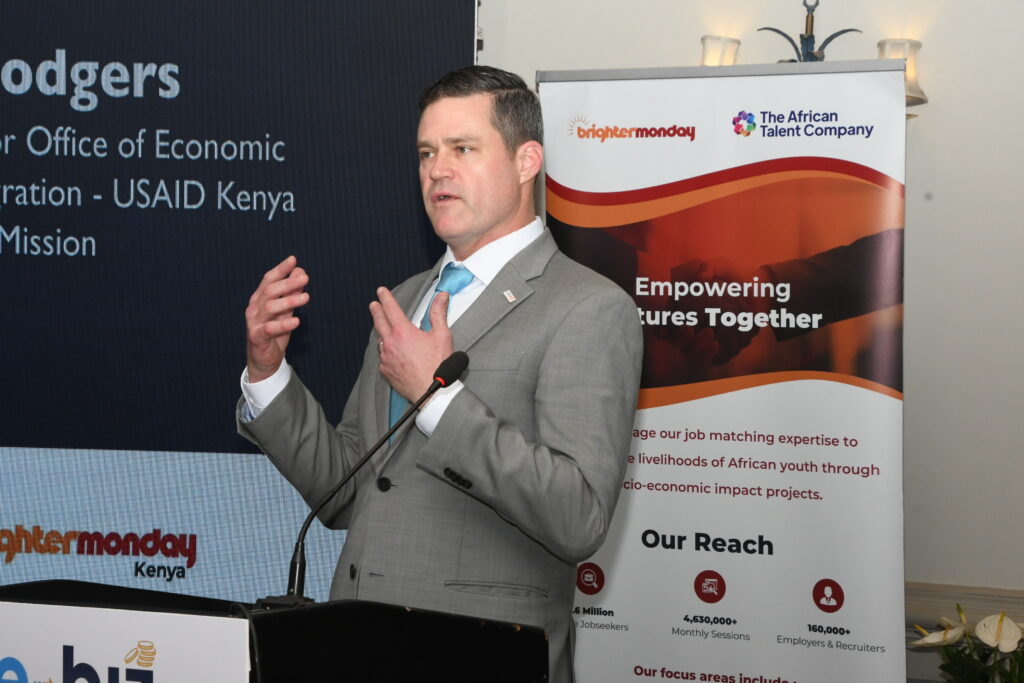E-commerce
The e-Biz Kwa Vijana project, a ground-breaking e-commerce development initiative, launched in 2023, has trained over 2,000 young entrepreneurs and Micro, Small and Medium Enterprises (MSMEs) who are with free digital skills and e-commerce training.
Chief Executive Officer of BrighterMonday, Chris Otundo, while speaking in a hotel in Nairobi, yesterday praised the initiative for its e-commerce impact in empowering thousands of young people and fostering business ecosystem engagement in Kenya.

Deputy Office Director, Office of Economic Growth and Integration (OEGI) at United State Agency for Development David Rogers, makes a statement at Norfolk Hotel on 13th June 2024 during an engagement forum for Kenya E-Commerce Strategy where the youth were urged to embrace online trade business which is highly paying.
“This is an indicator of the hunger for support and the strong entrepreneurial spirit in young people in Kenya today. We recognise and acknowledge the immense potential and power of e-commerce to revolutionise the local entrepreneurial landscape by equipping young people with the necessary knowledge and tools to expand their market opportunities,” said Chris Otundo.
The initiative, implemented by BrighterMonday Kenya and funded by USAID through the e-Trade Alliance, has also successfully onboarded 632 MSMEs onto various e-commerce platforms to help them venture into the next phase of their business growth and opportunity journey.
The project, designed to train up to 1,000 young entrepreneurs aged between 18-35 years, in leveraging online trading and digital platforms, also covered women entrepreneurs and people with disabilities.
Otundo underscored the diversity and inclusivity of the project, pointing out that 45 per cent of the participants were women out of the 2,093 online learners under the project, while 62 per cent were people with disabilities, thus ensuring that all individuals, regardless of physical ability, have the opportunity to acquire valuable digital skills.
In addition to the online training, Otundo said, 248 learners attended physical training sessions, with a 77 percent representation by women, highlighting BrighterMonday’s commitment to gender inclusivity in the digital space.

Chief Executive Officer (CEO) Brightermonday Chris Otundo speaks at Norfolk Hotel during E-Biz kwa Vijana close out event which was held at Norfolk hotel Nairobi on 13th June 2024. The CEO urged youth to embrace online trade business which is highly paying.
The CEO, while acknowledging the fact that there are more male-run businesses than women enterprises, emphasised the need to focus on youth and women who are vulnerable groups in society to give them a chance to grow their skills and fill the existing talent gap so they can take advantage of opportunities available and open up possibilities to the world.
“We have seen value coming from women and other marginalised groups, but fewer women participate in the programme,” he said.
State Department for Trade Principal Secretary, Alfred K’Ombudo, in a speech read by the Acting Secretary for Trade, Michael Mandu, noted the steady growth of the e-commerce sector in Kenya, with Kenya established as a leader in digital trade within the African continent and globally.
“The combined revenues from the sector were projected to grow to USD2, 928 billion in 2023, with a large share of this revenue being accounted for by the Small and Medium Enterprises as well as youth enterprises. This has contributed to job creation and employment opportunities for young people while also nurturing digital talents in the country,” said K’Ombudo.
Principal Secretary, State Department of ICT Eng. John Tanui, in a speech read on his behalf by Samuel Maina, Assistant Director ICT, disclosed that ICT Ministry has laid down enabling infrastructure and has collaborated with Kenya Power to utilize the company’s transmission lines to deploy 100,000 kilometers of fiber optic cables nationwide.
To ensure safe data protection, Tanui said Data protection has been enhanced for safe digital ecosystem and encouraged youth to take advantage of the digital space and government programmes including Ajira and Jitume to earn living.
During the event, participants reviewed the Kenya National E-Commerce Strategy Policy launched in December 2023 and the recent tax proposals contained in the Finance Bill 2024, which they said could have multifaceted effects on e-commerce adaptability and transparency in the country.

Acting Secretary, State Department for Trade Michael Mandu gives a keynote address at Norfolk Hotel on 13th June 2024 during an engagement forum for Kenya E-Commerce Strategy where the youth were urged to embrace online trade business which is highly paying.
Among the proposals include, a shift from the 1.5 percent Digital Service Tax to a 6 percent Significant Economic Presence (SEP) Tax, that E-Commerce players said could significantly impact profitability and operational costs of the E-Commerce platforms.
This was the same regarding the 20 percent Withholding Tax for non-residents and 5 percent for residents in the e-commerce space, which stakeholders said may present compliance challenges for smaller outfits, potentially hindering their participation in marketplaces.
“As stakeholders, we call for continuous engagement, knowledge-sharing, and collaboration with the government and the relevant departments to address these concerns, as the e-commerce ecosystem’s growth shall depend largely on how businesses and particularly young entrepreneurs adapt to this changing tax landscape,” said Otundo.
Similar sentiments were expressed regarding the proposed Data Protection Act amendment, which seeks to exempt personal data disclosure for tax purposes and has raised consumer privacy concerns.
Others include changes in Excise Duty, Eco Levy, and the motor vehicle tax, which portend a rise in costs for goods, with e-commerce platforms facing tighter margins while prompting reduced spending.